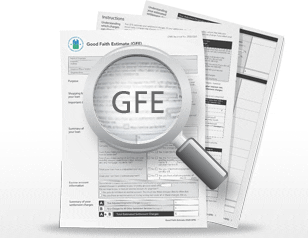 Yet another one of my clients is staying up at night worrying about whether his lender is about to bait-and-switch him, causing thousands of dollars to be added to his closing costs. The changes to the Good Faith Estimate rules, have made me more confident that this kind of consumer manipulation is in the past.
Yet another one of my clients is staying up at night worrying about whether his lender is about to bait-and-switch him, causing thousands of dollars to be added to his closing costs. The changes to the Good Faith Estimate rules, have made me more confident that this kind of consumer manipulation is in the past.
With the new GFE rules, enacted in 2013, it is harder for there to be problems at the last minute between the lender and the borrower. The days of bait-and-switch loans has ended, due to the strict limits on changes to the estimates.
When you apply for a mortgage, you have a right to get a completed Good Faith Estimate. Attorney Richard Vetstein covered this for me, back when I wrote for Boston.com. That link came out at the time the rules changed. It’s still a good reference.
 These are the fees that can legally change between the time Good Faith Estimate is prepared and closing day.
These are the fees that can legally change between the time Good Faith Estimate is prepared and closing day.
1. Fees with a ten percent leeway, if the lender chooses the vendor:
Title services and lender’s title insurance. This is the review of the title at the registry and certification that the title is marketable. That title is insured. The lender requires insurance for the part of the title that the lender owns.
Owner’s title insurance. A buyer can buy title insurance for the buyer’s equity in the property. The good news is that the owner’s policy is bought once, and will remain in force if you refinance or pay off your mortgage.
Government recording charges. These charges change, but not all that often.
Required services that you can shop for. This is a trash-basket.
Required services that we select. (“We” meaning the lender.) This is another trash-basket.
The other category contains fees that can change randomly. I divide these into two sections, the ones not in the lender’s control and the ones that can be in the lender’s control.
Not in the lender’s control:
It makes practical sense that the lender cannot make an accurate estimate on these things, since they are not in the lender’s control. Two of the items – deposits and closing dates – are matters of negotiation that buyers have some control over. Buyers can protect themselves by shopping around for homeowner’s insurance, if you are not in a condo with pre-existing insurance.
Initial deposit from your escrow – Your escrow payments are the funds that you are paying ahead for taxes and insurance. The lender can calculate what is expected, but if your closing date changes, or the municipal tax rate or billing cycle changes, these figures will change.
Daily interest charges. – Buyers pay interest on the principle starting on closing day. If the closing date shifts, that interest payment will change accordingly.
Homeowners insurance. – Buyers or the existing condo association choose the homeowners insurance. The lender has no control over the cost of that.
Title services and title insurance charges.
Required services that you shop for and choose someone not on the lender’s list.
At closing, on your Settlement Statement there is a side-by-side comparison of the figures on your Good Faith Estimate and the figures you pay at closing. If they are wrong, it is obvious to the closing attorney and to you.
